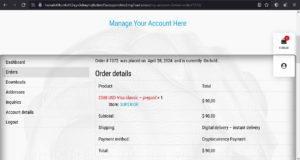Table of Contents
ToggleCash Cow Market Place – TOR Scam Report (5)
Onion Link:
Scam Report Date: 2024/05/08
Client Scam Report Breakdown
Original Scam Report:
The client reported the incident with the following message: “I bought a card, no updates, no money back. Proof is in the screen shot. If you can, please arrange to return my money. My Bitcoin Address: 1HVa6EjGL72rsZkzyFm5AryPSt7BP9Rm5T.” This concise report highlights the client’s frustration and request for a refund after purchasing a card, presumably a digital or physical item, which was never delivered or updated. The client provided a Bitcoin address for the refund, indicating the purchase might have been made using cryptocurrency. The accompanying screenshot, although not included here, is mentioned as proof of the transaction.
Photos:


Defining Terminology and Terms
Card: In the context of online transactions, a “card” can refer to various items such as gift cards, prepaid cards, or digital access cards. The client does not specify the type, but it implies a purchased item expected to be delivered or activated upon purchase.
Updates: The term “updates” refers to notifications or progress reports regarding the status of the purchased item. In e-commerce, updates might include shipping confirmations, delivery notifications, or activation statuses. The client’s mention of “no updates” suggests they received no communication after the purchase, indicating a lack of transparency or follow-up from the seller.
Money Back: This phrase refers to the process of refunding the client the amount spent on the purchase. It is a common practice in consumer rights to offer refunds when a product or service is not delivered as promised. The client’s request for a money-back resolution underscores their dissatisfaction and desire to reverse the financial transaction.
Proof: The “screenshot” mentioned by the client serves as proof of purchase. Screenshots are commonly used in digital transactions to capture and verify transaction details, such as payment confirmations, order summaries, or correspondence with the seller. This proof is crucial in dispute resolutions, as it provides tangible evidence of the transaction.
Bitcoin Address: The provided Bitcoin address (1HVa6EjGL72rsZkzyFm5AryPSt7BP9Rm5T) is a unique identifier for the client’s Bitcoin wallet. Bitcoin, a decentralized digital currency, allows for peer-to-peer transactions without intermediaries like banks. The inclusion of a Bitcoin address indicates that the client expects the refund in cryptocurrency, which might have been the original payment method.
Contextual Analysis and Implications
The client’s report underscores several issues common in online transactions, particularly with digital goods and cryptocurrency payments. Firstly, the absence of updates suggests poor communication and customer service from the seller. In e-commerce, keeping clients informed about their purchases is crucial to maintaining trust and ensuring satisfaction. The lack of updates in this scenario highlights a failure in this regard.
Secondly, the request for a refund and the mention of proof indicate that the client has taken reasonable steps to resolve the issue. Providing a screenshot as proof demonstrates the client’s willingness to substantiate their claim, which is essential in disputes. The seller’s responsibility, in this case, would be to verify the proof and process the refund accordingly.
Lastly, the use of Bitcoin for transactions presents unique challenges and advantages. Bitcoin transactions are irreversible, which means once a payment is made, it cannot be undone unless the recipient agrees to send the money back. This characteristic can complicate refund processes compared to traditional payment methods. However, Bitcoin also offers transparency through its blockchain technology, where transaction histories are publicly accessible and can be verified. The client’s provision of a Bitcoin address for the refund reflects the growing use of cryptocurrencies in online commerce and the need for sellers to adapt their customer service practices to accommodate these transactions.
In conclusion, the client’s scam report highlights critical aspects of e-commerce and cryptocurrency transactions, including the importance of timely updates, the necessity of providing proof in disputes, and the unique nature of Bitcoin refunds. Addressing these issues effectively requires robust customer service protocols and an understanding of digital payment systems to ensure client satisfaction and trust.






